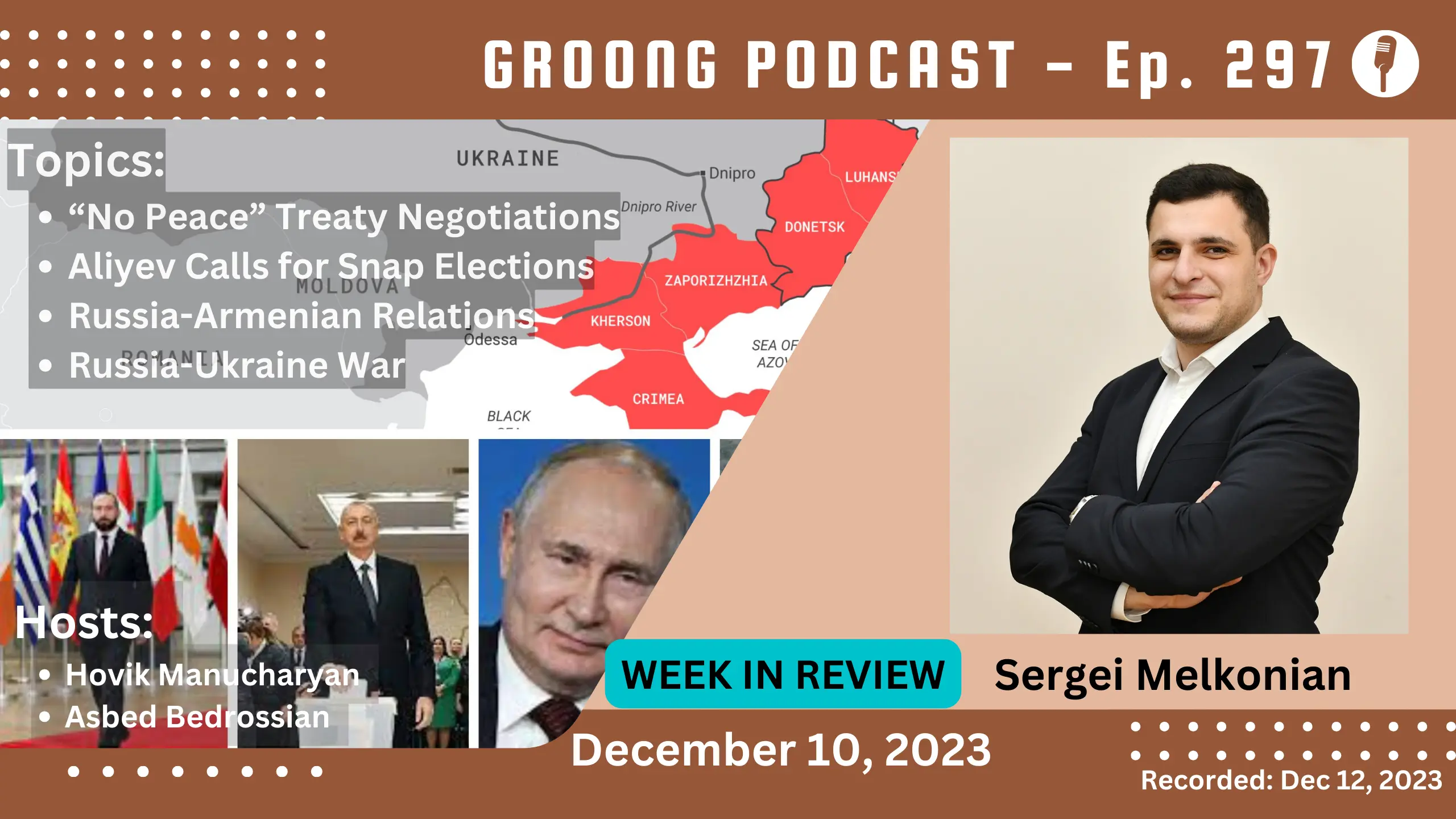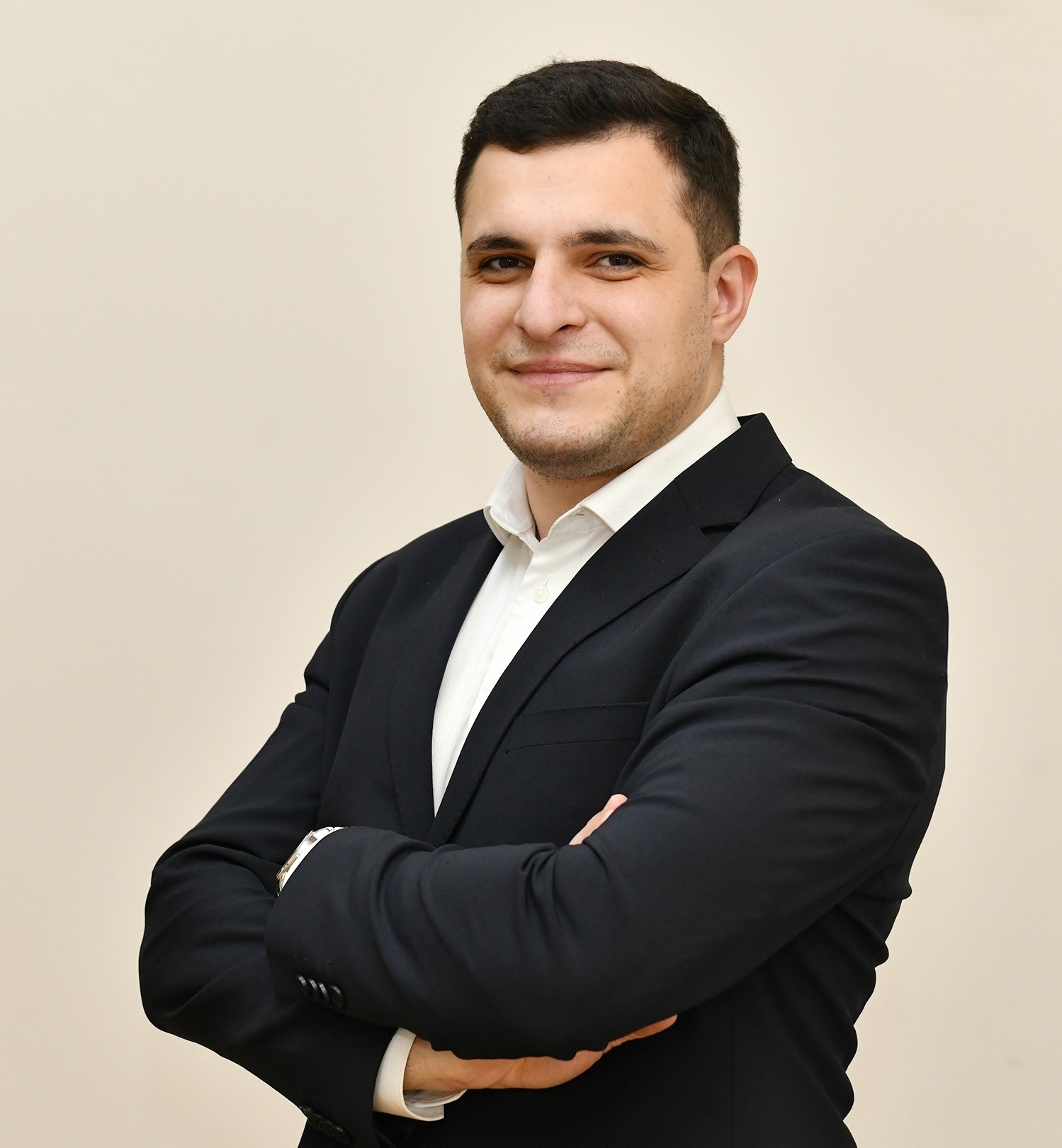Sergei Melkonian - 'No Peace' Negotiations | Aliyev Snap Elections | Russia Armenia Relations | Ukraine War | Ep 297, Dec 10, 2023 [EP297]
Posted on Wednesday, Dec 13, 2023 | Category: Armenia, Azerbaijan, Russia, Politics | Series: wir
Groong Links:
Guest:
Topics:
- “No Peace” Treaty Negotiations
- Turkish-Azeri goal: Demilitarized Armenia (aka Batumi Treaty 2.0)
- Humiliating Swap of Azeri Criminals for Armenian Hostages
- Aliyev Calls for Snap Elections
- Russia-Armenian Relations
- Russia-Ukraine War
Episode 297 | Recorded: December 10, 2023
Show Notes
“No Peace” Treaty Negotiations
Rollercoaster Continues
The so-called “peace negotiations” between Armenia and Azerbaijan resemble a rollercoaster. While Pashinyan and his government are begging for peace, Aliyev frequently goes from praising Pashinyan to making threats against Armenia. And so it was this week, when we were pretty sure that Aliyev had dumped the western platform for negotiations and we saw cancellations of high-level visits between the US and Azerbaijan and warnings from the US.
Then, ~~like nothing happened, ~~Assistant Secretary of State for the Bureau of European and Eurasian Affairs James O’Brien visited Aliyev, and suddenly things appear to be on the mend.
Well, at least what happened next was that Aliyev and Pashinyan issued a rosy joint press release with the following key points:
- Baku will release 32 POWs and hostages while Armenia will release the only 2 criminals it is known to keep.
- The Foreign ministers will meet in Washington DC.
- Armenia will support Baku’s bid to host COP-29 next year, and drop its own candidacy. On December 11, Azerbaijan was selected as the site of next year’s COP-29 meeting.
- Azerbaijan will support Armenia’s candidacy for Eastern European Group COP Bureau membership.
There was no discussion of the military-political leadership of Artsakh who are being held by Aliyev. If anything we read from Pashinyan that he has no plan or strategy for dealing with issues regarding Artsakh.
Western countries, Iran, and even Turkey, tripped over each other to congratulate the sides (one of which committed a genocide just 2 months ago) and welcome the “breakthrough” development in talks.
Questions:
- What’s your overall assessment of what happened here?
- What did Armenia concede this time, and why?
The sides made sure to mention that this deal to release Armenian hostages was reached bilaterally, however, their release seemed to suspiciously coincide with O’Brien’s visit.
Questions:
- What was discussed between the US and Azerbaijan? Who caved, and for what?
- Did the “Zangezur Corridor” or the bypass through Iran come up?
The US had previously warned that relations won’t be the same until Baku is on the “peace” path. There have also been so-called “threats”, that Washington is compiling a record of what happened in Artsakh, presumably referring to the complete ethnic cleansing in September 2023.
Questions:
- So, is Aliyev back on Washington’s “Peace path”?
- Is the US actually applying any pressure on Azerbaijan, and in what direction?
Turkish-Azeri Goal: A Demilitarized Armenia (or Treaty of Batumi 2.0)
Throughout these negotiations at gunpoint, analysts on our podcast have been almost unanimous that a peace deal on paper will not actually mean anything if Azerbaijan is not negotiating in good faith.
On Wednesday Aliyev, in his speech at the ADA, made some verbal addenda and clarifications to the Azeri position on “peace”. He highlighted that just because an Armenian-Azeri treaty is signed, it doesn’t mean that actual peace will take place. So there may be a treaty, but Aliyev is not committed to peace.
Specifically, he pointed out that Azerbaijan must have guarantees - perhaps outside the scope of the treaty - that Armenia will never again pose a threat to Azerbaijan. He complained about France and India providing arms to Armenia and said those actions are a “provocation” and once the level of arms becomes a threat, Azerbaijan will be forced to act.
The following day, Erdogan, on his way back from a visit to Greece also announced that Armenia must not be armed.
Questions:
- Are Azerbaijan, and by logical extension Turkey, honest partners in the negotiations with Armenia for peace?
- How do the Turkish sides envision an Armenia that will forever be “peaceful” for them?
- Is there a relationship between these demands to demilitarize Armenia and the fact that the Pashinyan government has invested so little in the Armenian armed forces, while spending more and more in police forces?
A Humiliating Swap of Criminals for Hostages
Regarding the prisoner exchange, Azerbaijan is known to hold much more than the 32 prisoners that were announced, with the prime example being the military-political leadership of Artsakh, including Ruben Vardanyan, Bako Sahakyan, Arkady Ghukasyan, Gen. Levon Mnatsakanyan, Gen. Davit Manukyan, and more, whom Azerbaijan clarified won’t be released.
In reality the number of hostages that Azerbaijan officially acknowledges holding is more than 50, while Armenian human rights activists say that they have proof of many more Armenians who were at one time in Azerbaijani custody and that the latter is withholding information about them.
The deal that was struck is that Azerbaijan will free 32 of the POWs it is holding. Armenia will free 2 Azeri brutal criminals, who infiltrated Armenia in 2022, and killed a peaceful, Armenian citizen! These guys are probably Azeri intelligence officers, spies, but they are not prisoners of war, there was no war when they sneaked into Armenia and killed Armenians. Genuine Ramil Safarovs.
Let’s remember that in November 2020, Pashinyan shipped to Baku another pair of criminals who had sneaked into Artsakh in 2014, and killed a teenage boy. Again, probably Azeri defense intelligence workers, spies, and valuable assets for Azerbaijan, but in no way “prisoners of war”. These intelligence assets were cheaply sent back to Azerbaijan by Pashinyan for no return. Aliyev did not return Armenian POWs in 2020 as per the November agreement he signed.
Questions:
- With the leadership of Artsakh still being hostage and apparently no remaining prisoners in Armenia to trade, what will be the fate of the military-political Artsakh in Azeri hands?
- The Nov 10 statement talks about the exchange of POWs. Based on internationally recognized human rights principles, which require releasing hostages immediately after hostilities are over. Just last week, Pashinyan talked about the principle of “all for all” exchange. So what happened to that? Why are we in a situation where everyone is willing to turn a blind eye towards this?
In the middle of these negotiations, Ilham Aliyev has called for early presidential elections to be held in just two months, on February 7, 2024, instead of the originally planned October 2025. Most analysts and observers are not aware of reasons for holding such snap elections.
Interestingly, just last week we were talking with Benyamin Poghosyan, and he noted that Azeri society will not remain in a state of post-war euphoria for very long, and Aliyev needs to come up with new schemes to keep his society in a nationalistic fervor and keep himself in power.
Questions:
- What do you attribute Aliyev’s rush to get “re-elected” now?
- By the way, let’s note here that Aliyev is neither elected nor a president. He’s a dictator, but everyone appeases him due to the energy resources in Azerbaijan, so they call him a president.
Russia - Armenia Relations
Russia was one of the last to “congratulate” the sides on the prisoner swap deal.
The Russian-Armenian relationship remains a major concern for us as it seems that the Pashinyan administration is talking about “allied relations” with Russia but walking in a completely different direction. At stake is Armenia’s membership in the CSTO, the EAEU, the CIS, Russia’s military base in Armenia, favorable energy prices (gas, nuclear fuel), 50% of Armenia’s exports, and a third of the economy, just to name a few of the issues.
The genie is out of the bottle. Russian and Armenian officials take pot shots at each other routinely. Even at the level of analysts and experts, the atmosphere is now very pessimistic. Stanislav Tarasov, generally a pro-Armenian analyst recently said that “Armenia is at a dead-end, without any partners”.
Questions:
- Sergei, you just came back from Russia, tell us what you heard? (Is Russia happy?)
- Armenian leaders’ apparently reckless policies notwithstanding, is Russia going to watch while this slow-motion trainwreck happens?
War in Ukraine
After nearly two years of gruesome fighting, hundreds of thousands of casualties, the war in Ukraine seems to be reaching the inevitable conclusion. The last-chance counteroffensive by Ukraine is now a resounding failure. Russia will have the initiative next and even the western press are now openly talking about a Ukrainian defeat. Certainly western military aid for Ukraine is starting to slow down; this past week Republicans in the US Congress blocked over $61 Billion in aid for Ukraine, and even though we think that’s more related to in-House partisan bickering than about Ukraine, the slowing down of aid is clearly evident.
Questions:
- The new world order will depend heavily on how the war in Ukraine is resolved. What’s your assessment of this war?
- How do you see the South Caucasus being affected by the outcome?
- Regardless of the outcome, is there any chance that relations with Russia will improve? Europe will still need to buy Russian gas through Azerbaijan; Russia will still put great value on its link with India and The East through Azerbaijan and Iran. So can we expect more of the same policies detrimental to Armenia, even if the hot conflict is over?
Topics from the Panelists
- Hovik: December 10, day of establishing Artsakh Statehood, in 1991.
- Sergei: Do not overestimate Azerbaijan, everything is possible.
Wrap-up
We hope you found our Week in Review helpful. We invite your feedback and your suggestions, you can find us on most social media and podcast platforms. Thanks to Laura Osborn for the music on our podcasts.
Guests

Sergei Melkonian
Dr. Sergei Melkonian is currently a Research Fellow at APRI Armenia, a Yerevan-based think tank. He served as assistant to President of Armenia, Armen Sarkissian, on foreign policy (Middle East and post-Soviet space). Sergei is also a guest lecturer at Yerevan State University and the Russian-Armenian University.
Hosts

Hovik Manucharyan
Hovik Manucharyan is an information security engineer who moved from Seattle to Armenia in 2022. He co-founded the ANN/Groong podcast in 2020 and has been a contributor to Groong News since the late 1990s.
Disclaimer: The views expressed by Hovik Manucharyan on the ANN/Groong podcast are his own and do not necessarily reflect the opinions of his employer or any other organization.

Asbed Bedrossian
Asbed Bedrossian is an IT professional, and for years oversaw the central IT enterprise infrastructure and services at USC. His decades of experience spanned across IT strategy, enterprise architecture, infrastructure, cybersecurity, enterprise applications, data center operations, high performance computing, ITSM, ITPM, and more.
Asbed founded the Armenian News Network Groong circa 1989/1990, and co-founded the ANN/Groong podcast in 2020.